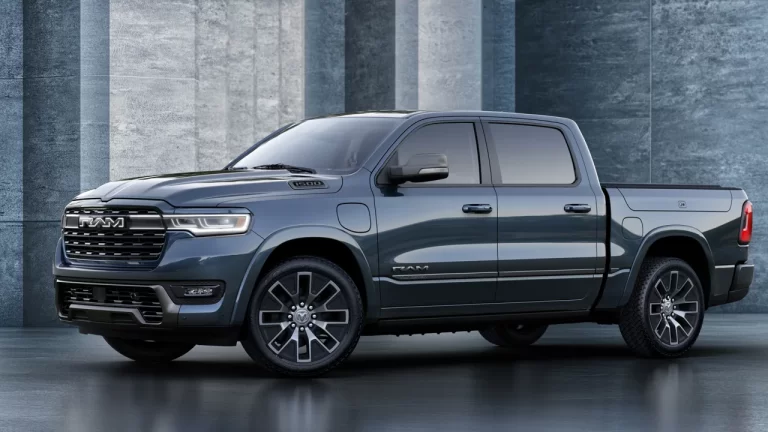Stellantis’ new Ramcharger pickup, expected to go on sale late next year, will be an “electric” truck, the company says. But really, it’ll be a hybrid, with a gasoline engine under the hood, the company announced Tuesday.
It will be sold alongside the Ram REV, the company’s actual fully-electric truck, expected to go on sale around the same time.
Tim Kuniskis, the head of Stellantis’ Ram truck brand, insisted during a press conference that the Ram 1500 Ramcharger is not a plug-in hybrid. The main distinction, he said, is that the Ramcharger’s 3.6 liter 6-cylinder engine is not connected, in any way, to the truck’s wheels. It is only connected to a generator that can charge the batteries and, in some situations, send power to the electric motors, which then drive the wheels.
Such a setup, however, is known as a “series hybrid,” to distinguish it from the more common “parallel hybrid” in which the gas engine can directly drive the wheels, as in a Toyota Prius. The Chevrolet Volt produced until 2019, was mostly a series hybrid, as well as the Fisker Karma, and many diesel-electric locomotives.
With fully charged batteries, the Ramcharger can travel as far as 145 miles without having to rely on gasoline. That’s far more than most plug-in hybrids currently on the market. Most can only go about 30 or 40 miles on a full charge before needing to use gasoline.
With a fully charged battery pack and a full tank of gas, the Ramcharger should be to drive a total of about 690 miles before needing recharge or refill, according to Stellantis. In terms of total range, that’s similar to much smaller, lighter non-plug-in hybrid vehicles like the Hyundai Sonata and Toyota Camry.
Also, the Ram truck can use DC fast chargers to quickly recharge its batteries. Most plug-in hybrids cannot use fast chargers, which can add 100 miles of driving range in just a few minutes.
Ram previously unveiled an electric-only truck, the Ram REV, which will also go on sale late next year. That truck will be able to travel up to 500 miles on a full charge but doesn’t have the Ramcharger’s gasoline engine.
The company is selling both the Ram REV and the Ramcharger so it can have another product it can sell to people who want to buy an electric pickup truck, but are still worried about range anxiety, Kuniskis said.
“There’s so many advantages to a battery electric vehicle. But there are certain things that are slowing people down. And if I can say the things that are slowing you down are charge time, range anxiety and infrastructure, you don’t have to worry about it with this,” he said.
Ram’s hybrid and electric truck will enter the market long after competitors have gone on sale. Stellantis chief executive Carlos Tavares has said that he wanted to use the delay to Ram’s advantage since he would be able to see what consumers thought of other electric trucks. Ford and General Motors, which both have EV trucks for sale, have recently scaled back, or delayed increasing, production. EVs, in general, have been selling at deep discounts in recent months, indicating consumers may be put off by the relatively high prices of these early battery-powered trucks.
While Stellantis hasn’t announced pricing for either electric truck, Kuniskis hinted that prices for the Ramcharger could be lower than for the Ram REV since the range-extended truck has a smaller battery pack. Batteries are the most expensive part of an electric vehicle.
The Ramcharger is driven by two electric motors, one powering the front wheels and the other the back, giving the truck all-wheel drive. Combined, the two motors can produce up to 663 horsepower and 615 pound-feet of torque, a measure of pulling power. That’s 268 horsepower and 172 pound-feet more than a gasoline-powered Ram pickup with a V8 engine.
Because the Ramcharger’s gas engine isn’t mechanically connected to the wheels, there’s no transmission or drive shafts running under the passenger cabin, the Ramcharger has the same flat interior floor as the Ram REV. That allows more space inside for comfort and for additional storage. Most gas powered trucks have a hump in the floor to allow room for those mechanical components.
— CutC by cnn.com


